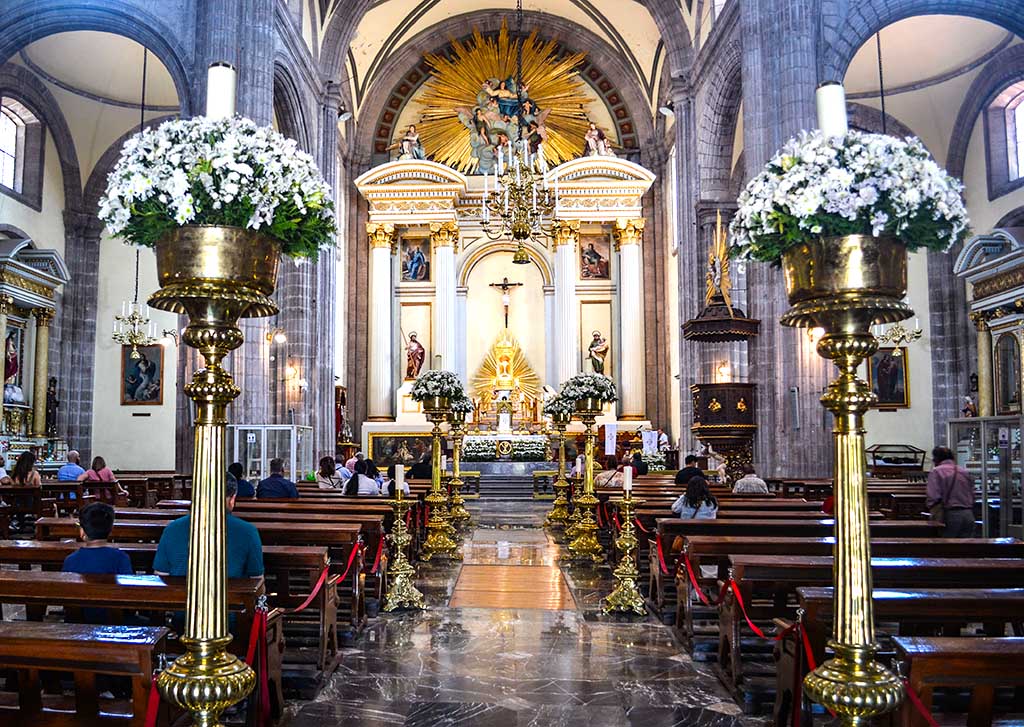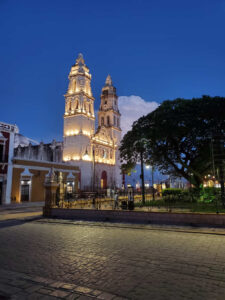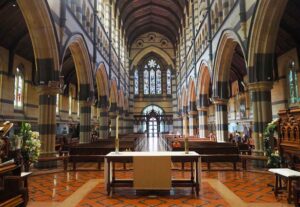The Metropolitan Cathedral of the Assumption of the Most Blessed Virgin Mary into Heaven or simply the Metropolitan Cathedral of Mexico City is one of Latin America’s largest and oldest Roman Catholic cathedrals.

Built right after the Spanish conquest of Mexico in the 16th century, over the ruins of the ancient Aztec capital of Tenochtitlan, the Metropolitan Cathedral is a treasure trove of history and a true architectural masterpiece.
The cathedral flanks the northern edge of the Zocalo in the Historic Center of Mexico City and features a gothic exterior and an excessively ornate interior making it one of Mexico’s most iconic landmarks.
History of Mexico City’s Metropolitan Cathedral
Right after the Spanish conquest of the Aztec Empire in 1521, Hernan Cortes ordered the construction of the Metropolitan Cathedral over the ruins of the ancient Aztec temple, Templo Mayor.

Construction began in 1573 but it was not until 1813 that the cathedral was deemed to be complete. It took nearly 250 years and several architects, sculptors, and painters to fully construct the Metropolitan Cathedral of Mexico City.
Much of the stone from the Templo Mayor ruins was used in the construction.
The Cathedral was built as a symbol of colonial and religious power in the Americas, just like the Catedral in Campeche. Eventually, it became a strong consolidating force for the New Spain Empire. Today, it functions as the seat of the Roman Catholic Archdiocese of Mexico.
Architecture of the Metropolitan Cathedral in Mexico City
Since Mexico City’s Metropolitan Cathedral was constructed over a period of 250 years by numerous architects, it reflects a mix of architectural styles. Gothic, Baroque, Renaissance, and Churrigueresque are some of the styles that you’ll spot at Cathedral Metropolitana.
The enormous gray-colored façade of the cathedral is built of red volcanic rock and gray stones. Built-in the traditional Gothic style, the main façade features two bell towers and a central dome. It has three portals, each flanked by the statues of saints and towering columns.
Inside the Metropolitan Cathedral

The interior of the Metropolitan Cathedral is ornate and lively when compared to the somber and gray exterior.
It displays a unique style of architecture called Churrigueresque. Churrigueresque is an excessively ornamented style of Spanish Rococo architecture and is frequently seen across churches in Mexico.

There are five altars inside the church, each more ornate than the other. The Altar of the Kings at the farthest end is the oldest work of Churrigueresque art in Mexico. It is also an exceptional one.

Apart from the altars, you’ll see a sacristy, a choir, and 16 side chapels dedicated to various patron saints. Beautiful oil paintings adorn the walls of the cathedral.
It’s also home to some of the largest organs that were built between the 1680s and the 18th century.

Right in front of the Altar of Pardon, at the entrance of the cathedral, is an unusual statue of a Black Christ or Christo Negro. Also known as the Lord of Poison or El Senor del Veneno, the Black Christ has an interesting legend in Latin America.

To save one of his loyal devotees who had been poisoned by his enemies, Jesus absorbed all the poison from his body. It saved the devotee, but the poison turned Jesus black. He was named Christo Negro ever since and has been revered across all countries of Central America.
The cathedral’s underground is the final resting place of many priests and archbishops.
Cultural Significance of the Cathedral
The Metropolitan Cathedral was listed on the UNESCO World Heritage list in 1987 by virtue of being the largest cathedral on the continent and the most significant one.
It is an outstanding example of colonial and 19th century architecture which heralded the beginning of the Kingdom of New Spain.
The Mexico City Metropolitan Cathedral has suffered numerous fires and earthquakes and is slowly sinking every year due to a phenomenon called subsidence. Yet, it still stands strong and is a powerful reminder of the history and the resilience of Mexican people.
Interesting Facts about the Metropolitan Cathedral
- The Metropolitan Cathedral in Mexico City is one of the oldest and largest Roman Catholic churches in the Americas.
- It is part of the Historic Center of Mexico City and Xochimilco, a UNESCO World Heritage Site.
- It took nearly 250 years to build the cathedral. Therefore, it sports several different architectural styles that designers added over time. Some of the most prominent styles that you can see at the Metropolitan Cathedral in Mexico City are Gothic, Baroque, and Churrigueresque.
- The cathedral is built over the ruins of the ancient Aztec temple called Templo Mayor. Stones from the destroyed temple were used in the construction of the cathedral.
- It is true that the Metropolitan Cathedral is sinking a little bit every year. That’s because of a phenomenon called subsidence that’s affecting all of Mexico City.
Practical Information for Visiting the Metropolitan Cathedral
Mexico City Metropolitan Cathedral Tickets
You do not need tickets to enter the Metropolitan Cathedral. It is free to enter. However, you’ll need to pay a small fee if you wish to enter the choir and the sacristy.
The cathedral is often included in several Mexico City walking tours that provide an immersive experience and deeper insights into the history of the cathedral.
Mexico City Metropolitan Cathedral Hours
The Metropolitan Cathedral is open from 9:00 am – 5:30 pm, every day of the week. Some areas may be cordoned off to visitors during mass. You’ll find the mass schedules here. Alternatively, join a guided tour of Downtown Mexico so you don’t have to worry about timings or crowds at the main sites. All you have to remember is to meet your guide.
How to get to the Metropolitan Cathedral in Mexico City?
The Metropolitan Cathedral is located right on the Zocalo or the main public square in Mexico City. Therefore, it is super easy to get to.
If you’re staying in the Historic Center, you can simply walk to the cathedral. If you’re staying further away, take the Metro Line 2 to get to the Zocalo/Tenochtitlan Metro Station. As soon as you get out of the station, the cathedral will be right in front of you.
Bio: Soumya Gayatri

Soumya Gayatri is a history enthusiast who has explored hundreds of UNESCO World Heritage Sites. Her writings about heritage travel have been published in BBC Travel and Architectural Digest. Through her travel blog, Stories by Soumya, she helps people plan immersive cultural trips around the world. Follow Soumya on Pinterest and Facebook.
Ohter Historic Posts You Might Like
- Salisbury Cathedral, home of the Magna Carta
- Must-visit Churches in Europe
- Spain’s Montjuic Castle
- Colosseum facts to know
- Latin American churches to visit






